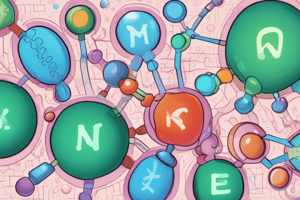Podcast
Questions and Answers
What is the primary function of measuring plasma levels of creatine kinase (CK)?
What is the primary function of measuring plasma levels of creatine kinase (CK)?
- To evaluate pulmonary function
- To assess kidney function
- To diagnose myocardial infarction (correct)
- To measure liver enzymes
CK2 (MB) isoenzyme is the only isoenzyme found in skeletal muscle.
CK2 (MB) isoenzyme is the only isoenzyme found in skeletal muscle.
False (B)
What is the time frame in which CK2 (MB) isoenzyme appears after the onset of chest pain during a myocardial infarction?
What is the time frame in which CK2 (MB) isoenzyme appears after the onset of chest pain during a myocardial infarction?
4-8 hours
The isoenzyme primarily associated with cardiac muscle is CK2, which is also known as ______.
The isoenzyme primarily associated with cardiac muscle is CK2, which is also known as ______.
Match the following creatine kinase isoenzymes with their primary location:
Match the following creatine kinase isoenzymes with their primary location:
Which regulatory protein is released into plasma in response to cardiac damage?
Which regulatory protein is released into plasma in response to cardiac damage?
Elevated serum troponins are less predictive of adverse outcomes than conventional CK2 assays.
Elevated serum troponins are less predictive of adverse outcomes than conventional CK2 assays.
What is the primary role of ALT in clinical diagnosis?
What is the primary role of ALT in clinical diagnosis?
Non-functional enzymes are actively secreted into the blood.
Non-functional enzymes are actively secreted into the blood.
What effect does a rise in ALT levels typically indicate?
What effect does a rise in ALT levels typically indicate?
Isoenzymes catalyze the same __________ in different organs.
Isoenzymes catalyze the same __________ in different organs.
What is the normal serum level range of ALT for males?
What is the normal serum level range of ALT for males?
Match the type of enzyme to its description:
Match the type of enzyme to its description:
Which of the following conditions may show a moderate increase in ALT levels?
Which of the following conditions may show a moderate increase in ALT levels?
Elevated enzyme levels in plasma indicate tissue damage.
Elevated enzyme levels in plasma indicate tissue damage.
Flashcards are hidden until you start studying
Study Notes
Enzymes in Clinical Diagnosis
- Functional enzymes are secreted into the blood by certain cell types.
- Example: Liver secretes zymogens (inactive precursors) involved in blood coagulation.
- Non-functional enzymes are released from cells during normal turnover and have no physiologic use in the plasma.
- Levels are fairly constant in healthy individuals, reflecting a balance between release and removal.
- Increased plasma levels of non-functional enzymes may indicate tissue damage.
Alanine Aminotransferase (ALT)
- Abundant in the liver.
- Elevated plasma levels suggest possible damage to hepatic tissue
- Normal levels:
- Male: 13-35 U/L
- Female: 10-30 U/L
- Normal levels:
- ALT levels may rise several days before clinical signs, such as jaundice.
- Moderate increase (25-100 U/L) can be seen in chronic liver diseases like cirrhosis and liver malignancy.
- Very high values (100-1000 U/L) are observed in acute hepatitis, both toxic and viral.
Isoenzymes and Diseases of the Heart
- Isoenzymes (isozymes) catalyze the same reactions in different organs.
- They have different physical properties due to variations in amino acid sequence.
- Their patterns in plasma can help identify the site of tissue damage.
Creatine Kinase (CK) Isoenzymes
- CK exists as three isoenzymes:
- CK1 = BB
- CK2 = MB
- CK3 = MM
- Each isoenzyme is a dimer composed of two polypeptides (B and M subunits).
- They exhibit distinct electrophoretic mobility.
- Virtually all CK in the brain is BB.
- Skeletal muscle primarily contains MM.
- Cardiac muscle contains about one-third MB and the rest MM.
Diagnosis of Myocardial Infarction (MI)
- CK2 (MB) isoenzyme is used for diagnosing MI because it is the only tissue containing more than 5% of total CK activity as CK2 (MB).
- Following an acute MI, CK2 (MB) appears in the blood approximately 4-8 hours after chest pain onset.
- Peaks in activity around 24 hours.
- Returns to baseline after 48-72 hours.
Troponin I and Troponin T
- Regulatory proteins involved in myocardial infarction.
- Released into plasma in response to cardiac damage.
- Cardiac Troponin I (cTnI):
- Highly sensitive and specific for cardiac tissue damage.
- Appears in plasma within 4-6 hours after an MI.
- Peaks in 8-28 hours.
- Remains elevated for 3-10 days..
- Elevated serum troponins are more predictive of adverse outcomes in unstable angina or myocardial infarction than CK2.
###
Studying That Suits You
Use AI to generate personalized quizzes and flashcards to suit your learning preferences.




